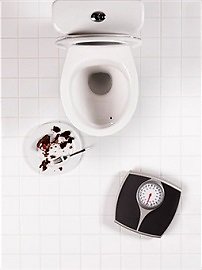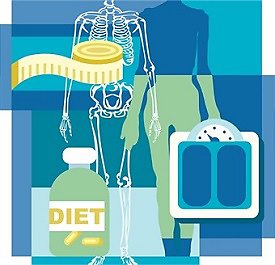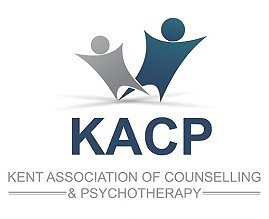Bulimia Nervosa
BN is characterised by strict adherence to rigid restrictive food diets followed by out of control binge eating and self-induced vomiting laxative/diuretic use or obsessive exercising without the purging.
In Bulimia, the individual will try to control their weight by restricting their diet to almost starvation levels, the sufferer will then experience irresistible craving and loss of control and resort to binge eating inordinately large amounts of, high calorific foodstuffs, that are otherwise forbidden, within a very short space of time. The sufferer is likely to experience acute shame and guilt, followed by resorting to self-induced vomiting, obsessive exercising and or taking laxatives/diuretics.
Once an eating disorder has developed it can easily become entrenched because your whole sense of self is consumed with food eating and body image. It will take huge perseverance, commitment and courage to change.
People with eating disorders seem to experience familiar physical symptoms, emotions and behaviours:
Typical Thoughts:
The focus of your attention is taken up with thinking about food and eating, and strict rigid rules
Split/black & white thinking:
When you don’t stick to your rules ‘I am a failure’ ‘I am weak’ ‘I am worthless’ ‘I am unattractive and unlovable’
‘If I eat anything not on my strict regime I might as well binge’
‘All of my self-value is based on what I eat or don’t eat’
‘If I start eating I won’t be able to stop I am out of control’
‘If I am not perfect I am a complete failure’
‘If I eat I will feel better and I won’t care’
Typical Behaviour:
Eating alone and not eating normal meals
Wearing bigger clothes when you have binged
Rigid diets and extreme food restriction that fail resulting in binging
Extreme attempts to control your weight, vomiting laxatives and exercise
Emotions:
Fluctuating moods
Anxiety
Depression
Shame and guilt
Low self-esteem
Physical Symptoms:
Including: weight gain, cessation of menstruation, loss of teeth, stomach ulcers, kidney damage, rupture of stomach and oesophagus and electrolyte abnormalities leading to heart attack and stroke
BN is a serious condition the consequences of frequent misuse of food can be severe. It is advisable to speak to your GP.
Cognitive Behavioural Therapy (CBT) has the most evidence and research behind it for treating eating disorders
The perceived benefits of change are likely to need to outweigh the advantages of staying the same for you to contemplate working on your BN
Binge Eating
Initially you may experience feelings of excitement, pleasure, relief, calmness even a trance like state. Very quickly, when the binge continues in an uncontrollable manner these feelings give way to negative thoughts and feelings of guilt, shame disgust and self-loathing. Followed by the need to urgently get rid of the food to create that ‘empty feeling’ again.
If you are severely affected by BN you probably do not want to know that severely restrictive diets fail most people, and each time you fail your rules you double up on being more determined, more rigid and more restrictive to such extreme levels that are virtually impossible to stick to, each time ending in severe self-criticism for being ‘weak and a failure.’
You have got yourself caught in a vicious cycle of not being able to tolerate strong feelings, basing your self-worth on: your control of your eating habits, shape and weight leading to strict dieting which leads to nutritional deprivation and physical hunger, and preoccupation with eating and food. This then leads to binging and compensatory behaviour of purging, exercise and laxatives. You then renew your efforts, to stop yourself feeling bad about yourself, vowing that you will be stricter next time and the vicious cycle begins again.
If you leave more than five hours between eating during the day, your body prepares for a further lack of food, lowering your metabolic rate in order to preserve energy. So the next time you eat, food will be metabolised for the purpose of storage. Just what you want to avoid!
It is considered helpful to begin to monitor your daily food intake, and the thoughts and feelings you have before a binge including all the ‘grotesque’ food you have consumed and what you do with it afterwards. Once you begin to become aware of the recurring thoughts and situations that contribute to binging you will see patterns that can be changed
Another step in beginning to break the vicious cycle of your disordered eating is initiating a regular eating regime. People who are not underweight do not usually put on weight with regular eating and you will be less likely to binge. It is the binge that puts on weight even if you purge. It is also sensible to restrict your weighing to once a week at the same time, as your weight can fluctuate by 2-3 kg a day and depends on many factors besides what you have eaten.
People binge eat because of the effects of hunger and to regulate, control and numb distressing feelings and moods. It becomes an automatic response however; binging is more of a problem than a solution.
Stopping binging will take time to conquer, and there will be relapses, try not to be too hard on yourself. If you are going to binge anyway you could try consciously waiting a few minutes, gradually extending the wait and consciously deciding what you are going to eat, laying it out on plates rather than eating from packets. This may begin to give you some choice and a sense of control over your behaviour.
Purging Laxatives & Exercise
Purging
You might be surprised to learn that 40% - 70% of the food you have eaten will already have been absorbed by the time you come to purge, so the reality is that vomiting is not a solution to weight control, it is more the problem.
Like purging compulsive and excessive exercise, as a means of weight control, to compensate for binge eating is unhealthy, can lead to health problems and is not the solution to the problem
Laxatives & Diuretics
You probably think that you can binge eat with impunity, because you can always get rid of the food by using large amounts of laxatives/diuretics, and you have probably quite quickly become used to their unpleasant side effects. You may be surprised to learn that as a weight control strategy they are just about useless. Calorie absorption begins in the mouth and oesophagus, and most of it in the stomach and in the small intestine. By the time any waste product arrives in the large intestine 90% of the nutrients have already been absorbed, you are at best only getting rid of 10% of those calories. Excessive laxative/diuretic use can cause health problems. They are also not a solution to the problem.
Self-Worth Moods & Negative Thinking
Self- Worth
Most of us would include work, relationships, family, hobbies, study social life etc. in our own self-evaluation. It is likely therefore, to be beneficial to gradually enlarge upon other areas in your life. Remembering that motivation may not just appear, you may need to try activities several times before experiencing the rewards of achievement and pleasure. Life can become more balanced and it is likely that you will begin to feel more content with time.
Moods
People with eating difficulties seem to have great difficulty sitting with and processing intense negative feelings like guilt, hurt, anger depression, and rejection. It has become an automatic response to seek immediate gratification from emotional distress by self-harming, binge eating, and starving, and alcohol and drug abuse to induce a kind of calming numbing effect. While these actions act as a short term escape they do not prevent negative experiences from happening and you do not learn to cope with normal distressing feelings. Moreover, the more you try to avoid emotional pain the worse you will feel and you are just adding further distress on top of what you are already feeling.
Reacting to your moods in the way that you do is one of the mechanisms which help disordered eating keep going. It is likely that you will need to learn to cope more effectively with your feelings before you can fully overcome your BN. There are skill that can be learned, and other ways of learning to cope with distress.
However, there are times when we all just need to get through a crisis:
- Actively just stop coping, give yourself a break
- Self-encouragement- “I will get through this” “this will pass in time” “I will be fine”
- Relaxation exercises
- Imagine you are in a favourite place
- Use your five senses
- Sight- look at a beautiful flower
- Sound- listen to the sounds of nature or your favourite music
- Smell- try some aromatherapy oils, burn a candle
- Taste- try a hot soothing drink
- Touch- put some clean sheets on your bed, have a bubble bath
- Bring all of your attention to focus on what you are doing right now. Mindfulness skills involve learning to live in the moment without judgment.
Challenging unhelpful thinkingOur behaviour and our feelings are greatly influenced by our thoughts. If you have disordered eating and body image concerns, you think almost exclusively about your shape weight and ability to control your eating. These thoughts are generally negative about yourself. It is easy to confuse thoughts and feelings, it is helpful to begin to distinguish them; feelings can be described in one word happy sad angry, thoughts are often a string of words going through your mind. To begin to become aware of your recurring thoughts you could try jotting down the situation, your feelings and thoughts, evidence to prove your thoughts are true evidence to prove your thoughts are not true finishing with a more balanced realistic thought.
Change
There are a number of online recovery programmes and plenty of books available. A confidential supportive professional relationship may be particularly helpful in learning to manage overwhelming moods. You can access help from NHS Psychological Services and Privately. Good Luck!
You are welcome to contact us Email









